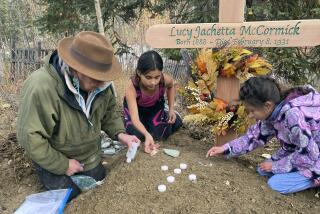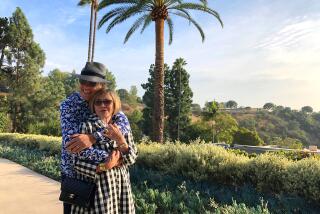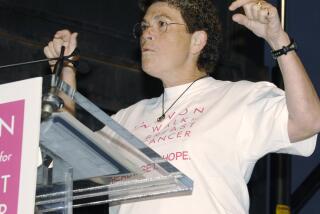Her Gift Outlasted Her Life
- Share via
During my first year of medical school, I met an old friend whom I hadn’t seen for years. One of my first patients, she was to teach me the most important lesson of my medical training: the magic of story.
The first semester had been full of lengthy, regimented, theory-laden lectures. The topics seemed irrelevant to the daily practice of medicine or to people’s lives. I labored under the delusion that I could learn it all, or at least collapse valiantly trying.
As our training progressed, we inched closer to patients. Our textbook assignments and lectures gave way to case scenarios discussed in small groups. We met the patients only as anonymous adults or children referenced by age and gender. We knew nothing about their lives or who they were as people.
One afternoon this all changed. Our small group was meeting for our scheduled pathology rounds, looking at the clinical presentations of diseases through microscopes or on slides of preserved specimens. It was a beautiful, warm autumn day, and the wind was blowing the last of the leaves from the trees. I was daydreaming of being outside, perhaps going for a run, vaguely aware of the discussion going on in the background.
Then the class turned to the last case study in our handouts. The patient was a 17-year-old female who had developed knee pain over a few days to weeks. She was diagnosed with osteosarcoma of the femur, one of the most common bone cancers in teens and young adults. Her leg was amputated at the hip in an attempt to save her life. Despite aggressive treatment, she died.
The story sounded familiar. In my thoughts I was suddenly back at Kelvin High School in Winnipeg, Canada, during the autumn of 1979, my senior year. In the distance I saw the silhouette of a girl at her locker, sorting through her backpack and books. She turned, and I recognized the beaming face of Jocelyn Hutton, a slender brunet with an infectious smile and a magnetic personality. I had not thought of her for years.
The last time I had seen her was several months later, around Christmastime. She had been diagnosed with osteosarcoma. Her leg was gone. She was in a lot of pain, but her smile was just as unforgettable. She had told her father that she believed her vocation was to tell others that it’s OK to die. She died a short time after our last visit. The home she lived in is now a hospice known as Jocelyn House, in a lovely, quiet neighborhood of Winnipeg.
Back in the classroom, I opened my eyes, and my attention returned to the slides.
“What year did this case occur?” I asked.
The instructor didn’t know. “It must have been years ago,” she replied.
My classmates’ banter quieted. A few glanced at me, then looked away. I felt a growing unease in the pit of my stomach, and my heart rate quickened.
The patient’s chest X-ray was displayed, showing lungs filled with a tumor that had spread from the leg cancer.
“What’s the date on the X-ray?” I asked.
The instructor looked carefully and said, “1979.”
The same year Jocelyn was struck by cancer.
I looked up at the screen once again and stared. The instructor advanced the slide projector, and a picture of Jocelyn’s cancerous, amputated femur appeared on the screen. Some of my classmates, realizing that the images displayed on the screen had a connection with my past, bowed their heads. I continued to see Jocelyn’s face before me as we filed out of the classroom.
I soon found myself out in the concourse by the seminar rooms. I sat by myself but wasn’t alone.
A few minutes passed, and then a classmate approached me. “Joel, who was she?”
“She was a good friend with a beautiful smile,” I said.
The gift of Jocelyn’s story opened my eyes to people’s lives and their enduring legacies in a way my medical studies never did or could. Our chance meeting that afternoon, after so many years, permanently shaped the way I practice medicine.
*
J.W. Carter practices life and emergency medicine in Duluth, Minn. He may be reached by e-mail at jcarter@d.umn.edu.






